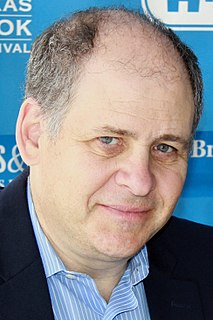A Quote by Jonathan Raymond
I guess I will say, going back to the Judaism questions, there are mental reflexes or patterns that I think of as Jewish in my own feelings about mysticism and theology.Franz Kafka is someone I very much revere. If I believed in holy texts I'd go to him as a touchstone. Not that I read Kafka all the time at this point. In a way, this is what I most want to talk about and it's the hardest to talk about.
Related Quotes
Obviously I've been reading Kafka for a long long time, since I was really young, and even before I ever read him I knew who he was. I had this weird sense that he was some kind of family. Like Uncle Kafka. Now I really think of him that way, the way we think about an uncle who opened up some path for being in a family that otherwise wouldn't have existed. I think of him that way as a writer and a familial figure.
What happens at the average church or synagogue or mosque is that I don't know many priests or ministers or rabbis who say to their congregation, 'go home and talk about the religion at the kitchen table with your kids...talk about God, talk about what this is all about.' They say in general, come back on the weekend, we'll talk to you about it.
I think we are afraid of each other when it comes to sex, because we read so much about sex, we talk so openly about sex, we see movies and we read books; but when we are face to face with someone else, we forget our individual patterns; that we are unique. So we try to repeat other people's patterns, according to what we seen and what we heard. So most of us are very frustrated, because we don't accept our individuality as far as sex is concerned.
Kafka is one of my very favorite writers. Kafka's fictional world is already so complete that trying to follow in his steps is not just pointless, but quite risky, too. What I see myself doing, rather, is writing novels where, in my own way, I dismantle the fictional world of Kafka that itself dismantled the existing novelistic system.
The part of the strangeness of coming back from the war is the way we talk about it. We try to have a discussion about the war that doesn't turn into a discussion about one political side or the other. I wanted to reach out and talk to people about it through fiction, the way a narrative can draw someone in and ask them those questions.
The thing about writing or making art is that I'm not thinking about that stuff while I'm doing it. Like the driver's ed kid, in retrospect I see that that was meaningful, and I felt close to him in that way, but at the time I just thought it was fun to draw, and that's all it was. I think that's what's weird about life and about making art. You have to talk about it later. I guess I should be prepared to talk about it now. That is why I'm here. But again, pass.
When I wrote 'Your Republic Is Calling You,' it was Franz Kafka's writing that I had most in mind, and James Joyce's 'Ulysses.' Entirely out of the blue, Kafka's characters receive an order to go somewhere, and when they try to comply, they never quite manage it. Ki-yong in 'Your Republic Is Calling You' is precisely that sort of character.
By the time Kafka was seven or eight years old, he already had a relatively dark view of the world derived from experiences in his own family. This told him that the world was organized in a strictly hierarchical manner and that those on the top were allowed to mete out punishment in any way they chose. They were entitled to leave those on the bottom uninformed about the rules to which they subscribed; they weren't even required to follow their own rules - this is how Kafka described it in his later Letter to My Father.
We typically don't talk about something until we are about to ship. Not just for AI, but for anything: the comparison is generally what we are shipping compared to what someone else is talking about that is going to happen sometime in the future. A lot of people sell futures, I guess, is the way to think about it.





































